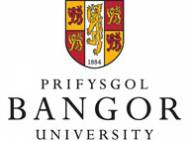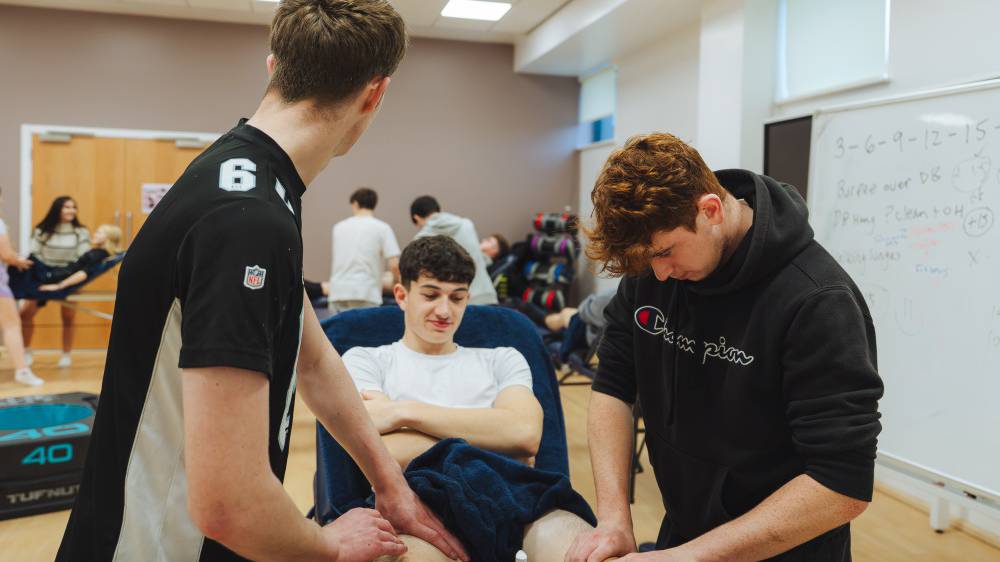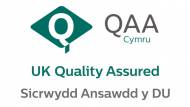BSc (Hons) Sports Coaching & Performance Science (Top-up)
Key Details
- Available at:Rhos-on-Sea
- Study Mode:Part-time, Full-time
- Course Length:
Full-time: 1 year OR Part-time: 2 years. Also available on a modular basis.
Wednesday & Thursday, 9am - 5pm
- UCAS Codes:CX61
BSc (Hons) Sports Coaching & Performance Science (Top-up)University-level Courses
Part Time
If you are applying to study part-time you can apply directly to the campus of your choice.
Full Time
If you are applying to study full-time you can apply directly to the campus of your choice.
Course Description
If you have already completed the FdSc Sport Science (Sports Coaching) (or equivalent), then this course gives you the opportunity to progress onto Level 6 and gain a full honours degree.
This programme will allow you to:
- build on the vocational sport coaching and performance science experience, providing a more detailed academic framework
- allow students to acquire and convey new perspectives in sport coaching and performance science, challenging previous viewpoints
- enable learners to undertake independent learning and academic research within the sports discipline
- develop critical awareness of sports coaching skills and performance principles applied in a range of sporting situations
- to improve health and engagement in sport/physical activity
- provide the opportunity for learners to enter postgraduate study upon completion
- develop an independent awareness of approaches used in the sporting world and their application in a wider context
- provide advanced investigatory skills and subject knowledge for learners to develop a career within the sector
Modules include:
- Dissertation
- Advanced Coaching Pedagogy
- Stress & Anxiety in Sport
- Physical Activity for Health & Fitness
- Contemporary Issues in Performance Interventions
Additional information
More detailed information on Modules is to be found in the ‘Additional Campus/Course Information’ section.
Entry Criteria
Academic Requirements
Entry onto level 6 will be direct for those progressing students from the GLlM Sports Coaching & Performance Science Foundation Degree to the respective GLlM Bachelor Degree (Hons) Sports Coaching and Performance Science, after successful completion of the foundation degree.
Entry onto level 6, for external applicants, will be considered on an individual basis in line with GLlM credit transfer policy, based on previous successful study of 120 credits per level (240 credits total) in a compatible qualification (within the time frame outlined in the policy).
For individuals who do not meet the above academic requirements we will consider a wide range of non-standard or professional qualifications and experience, through the submission of a portfolio for accreditation of prior learning (APL/APEL/RPEL), in accordance with GLlM regulations and policies.
Language Requirements
- For overseas applicants, for entry onto Levels 5 or above, English fluency to IELTS 6.0 or higher (with no element less than 5.5)
All places are subject to satisfactory interview.
If your qualifications do not meet the entry requirements listed above, we would still encourage you to apply for the course you're interested in, as many of our courses will consider learners based on their previous work and skills experience rather than their qualifications.
Delivery
The course is delivered through a blend of the following:
- Lecture Presentations
- Practical sessions
- Collaborative learning
- External visits
- Placements
- Seminars
Timetable
- Full-time: 1 year, 2 days per week (typically 9am – 4:30pm, Wednesday & Thursday)
- Part-time: 2 years, 1 day per week (typically 9am – 4:30pm)
Typically it will take around 100 notional learning hours per 10 credit modules, with an approximate 30% scheduled learning and guided activity and 70% independent study. The scheduled learning may vary per module depending on the type of delivery, subject content requirements and the independent study may vary based on individual student’s development. The guide for students is to plan for 1200 notional learning hours per year, with approximately 360 hours scheduled learning hours (typically over 30 weeks), including timetabled hours, work placement, employability based learning and guided activity, and approximately 840 hours independent study hours per year of study.
We recommend students to continue with work experience as good practice developed during level 4 and 5 employability modules as this would be advantageous for level 6 student’s personal and professional development.
Fees
Visit our course fees page for information on full and part-time degree course fees.
Financial Support
Visit our financial support page for information on the range of support available.
Additional costs may be associated with the following:
- DBS check
- GLlM sportswear (optional: £20-£40)
- Academic poster printing (£5)
- Vocational and professional industry qualifications (optional: Example - Football Leaders Award £70)
- External Trip (optional: e.g. Middlesex University Student S&C Conference £25)
More detailed information on other costs associated with your course and work placements/work experience (if applicable) will be outlined in the programme validation document and explained to you at your interview.
Start date
September
Contact
For specific course enquiries, please contact:
Steve Kehoe (Programme Leader): kehoe1s@gllm.ac.uk
Sian Backhouse (Administration): backho1s@gllm.ac.uk
For general enquiries about our degrees, please contact: degrees@gllm.ac.uk
Assessment
The course is assessed through a blend of the following:
- Essays
- Reports
- Practical Interventions
- Coaching Skills Assessments
- Presentations
- Article Critique
- Academic Poster
- Case Studies
Feedback
Where relevant, assessments will be marked and returned to students with constructive and developmental feedback. Effective feedback combines information which enables students to understand the strengths and limitations of their past performance, and information which enables them to recognise how future performance can be improved. Students will be provided with feedback in a timely manner and this feedback will justify how the grade has been awarded. Students will have the opportunity to reflect on the feedback given and identify their strengths, things they found challenging and areas for development that they will feed forward to their next assessment. Feedback will include linking evidence to assessment criteria to demonstrate how the student will have met the learning outcomes.
Progression
Progression to further study could include:
- progress to further postgraduate study (masters or PhD)
- Postgraduate Certificate in Education with QTS (PGCE)
There are many different types of careers in this industry. Some of our previous graduate have gone on to careers in:
- Teaching
- Coaching
- Coach Education
- Physiotherapy
- Graduate jobs in various industries
- Personal trainer
- Sport Scientist
Campus Information Rhos-on-Sea
For every 10 credits, students should engage with around 100 notional hours of learning. This will be approximately 30% direct learning contact, and 70% independent student learning.
Unit information
The course consists of the following modules:
Level 6
Advanced Coaching Pedagogy (20 credits)
The aim of this module is to continue to develop knowledge and understanding of coaching practice but also develop a critical awareness of the topic. Students will examine the complex nature of the coach –athlete relationship and how coaching behaviour can have a negative impact on this. Opportunities will exist to apply these concepts in practical settings, through interventions to coachings.
- Assessment 1: The Coach-Athlete Relationship Essay 50%
- Assessment 2: Coach Behaviour Intervention Presentation 50%
Contemporary Issues in Performance Interventions (20 credits)
The aim of this module is to explore the physiological and psychobiological concepts of fatigue that limit exercise performance and exercise techniques with contradictory findings within the literature. Students will also continue to develop practical coaching and instruction skills through an element of practical assessment and the critique of current training interventions
- Assessment 1: Human Fatigue Exam (pre-seen question) 50%
- Assessment 2: Coaching Technique Practical and Critical Review 50%
Dissertation (40 credits)
The purpose of this module is to build upon the research proposal and carry out an independent piece of work. Students must seek and be approved to carry out the research by the ethics committee before beginning the research process. Students are required to collect primary/secondary data, analyse, and provide conclusions based on scientific outcomes in a written format.
- Assessment 1: Annotated Bibliography 20%
- Assessment 2: Independent Research Investigation 80%
Physical Activity for Health & Fitness (20 credits)
The main aim of this module is to explore evidence-based exercise recommendations for specific conditions and populations and how these contribute to health-related training programmes. Also, the role of sport practitioners in the wider context of public health and wellbeing will be investigated. Student will also review behaviour models related to exercise activity
- Assessment 1: Academic Poster 60%
- Assessment 2: Article Critique 40%
Stress & Anxiety in Sport (20 credits)
This module aims to educate learners on the theories and models of anxiety and the relationship to performance and to equip learners with the skills and knowledge on the effectiveness of an intervention. Students will study the psychological principles that underpin athlete’s behaviour and develop ways to aid athletic performance by applying sport psychology theory to real-life
- Assessment 1: Anxiety & Performance Essay 50%
- Assessment 2: Psychological Intervention Presentation 50%
Other details
Course type: University-level Courses
Level:
6
Programme Area:
- International
- Sport and Outdoor
Awarding Body: Bangor University
Bilingual:
Possible to complete 33% of the course through the medium of Welsh and receive a scholarship from the Coleg Cymraeg Cenedlaethol.
Awarding Body


